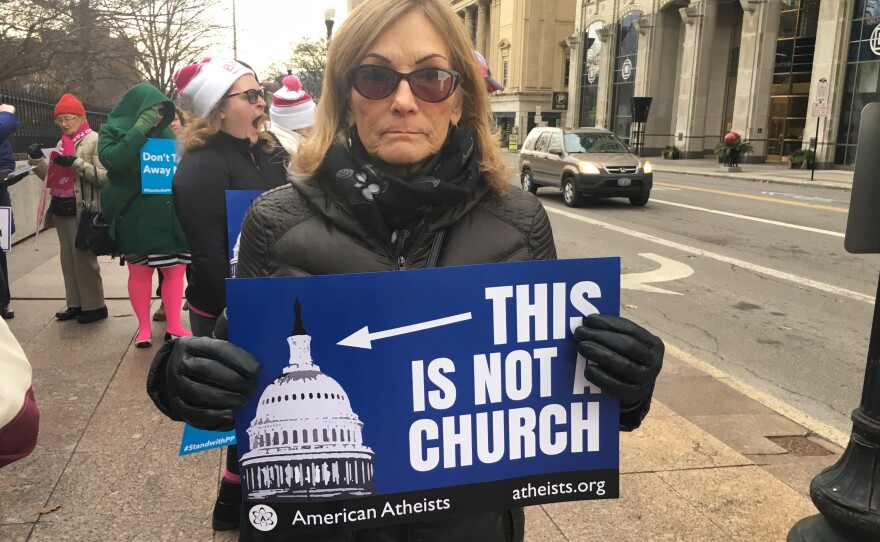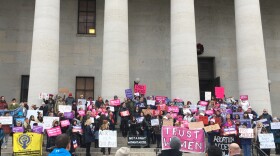The Ohio House had the votes to override veto of a . The Senate tried to follow suit but, in the end, it couldn't. Here's what happened.
The so-called, “l,” would end abortion at the point a fetal heartbeat is detected. Kasich vetoed it last week but Ohio House members who came back to the Ohio ±¬ÁĎłÔąĎ to conduct possible veto overrides mustered enough votes to overcome it. . The Senate needed 20 votes to override the veto but could only come up with 19. Republican Senators Bill Beagle, John Eklund, Gayle Manning, Matt Dolan and Stephanie Kunze voted with all of the Democrats who were united against the override.
It was a deja' vu of sorts. Two years ago, the same thing happened. Kasich vetoed the bill and the Ohio General Assembly was not able to override that veto.
There was a lot of pressure from advocates on both sides of the issue. Early Thursday morning, as lawmakers arrived to consider legislative vetoes, dozens of opponents of the “Heartbeat Bill” carried signs and chanted outside the building. Planned Parenthood of Ohio President Iris Harvey said the protestors wanted to send a strong message to lawmakers to convince them not to override Kasich’s veto of the bill. While Harvey and her group are pleased Kasich vetoed the “Heartbeat Bill,” she is not happy with the governor because he signed into law another bill that outlaws a procedure used in abortions performed at 12 weeks of gestation.
“We want Kasich to know we are following him in 2019. We are following him in 2020. And we are going to derail any plans he has for Washington, D.C. and the White House. No White House, no way,” Harvey said.
Meanwhile, Janet Folger Porter with Faith 2 Action, one of the strongest proponents of the bill, was at the ±¬ÁĎłÔąĎ, appealing to lawmakers to override Kasich's veto. Ohio Right to Life, the state's largest anti-abortion group, had always been neutral on the "Heartbeat Bill" but on the morning of the votes, the organization had, saying it "supports a pathway forward" for the bill.
The Ohio House passed the override of the "Heartbeat Bill" 60 to 28. "Praise the name of Jesus," Folger Porter said immediately after that vote. She said she was hopeful the Senate would follow suit. But that didn't happen.
After the Senate vote, Lori Viars, another supporter of the "Heartbeat Bill," expressed disgust with Republican Sen. Bill Beagle who she said flipped his vote at the last minute. Beagle has not yet responded to a request for an interview to confirm that. Viars said supporters of the legislation plan to bring it back up in the new Ohio General Assembly, possibly as early as January. If, and when, it is passed through the new general assembly that will be seated in January, Governor-elect Mike DeWine has said he will sign it.
Some of those who voted against the "Heartbeat Bill" have questions about its constitutionality. In his veto of the “Heartbeat Bill,” Kasich said it is likely unconstitutional. And he said unsuccessfully defending it in court would cost hundreds of thousands of dollars. Harvey said the "Heartbeat Bill" is unconstitutional because the ban would kick in at about six weeks into a pregnancy and added many women wouldn’t even know they are pregnant before that point.
The "Heartbeat Bill" doesn't allow an exception for cases of rape or incest. That is why some lawmakers, who said they otherwise supported it, were unwilling to vote for it. Doctors testified in committee that the bill would get in the middle of the doctor-patient relationship. The American College of Obstetrics and Gynecology and the Ohio Medical Association opposed the "Heartbeat Bill." The bill does contain a narrow exception if the health of the mother is affected but some doctors who testified against the bill said it was too vague.
Bills similar to the “Heartbeat Bill” have passed in a handful of states but courts have prevented them from going into effect. A key lobbyist for the bill’s passage, Janet Folger Porter, said Ohio’s bill is different.
“This is the bill that was crafted exactly for the Supreme Court. It was meant from its birth, from its conception, to be before the court. Nothing else needs to be done to this and anything else is a delay that not only hurts its chances for override, it can kill the bill and the babies it is meant to protect," Folger Porter said.









